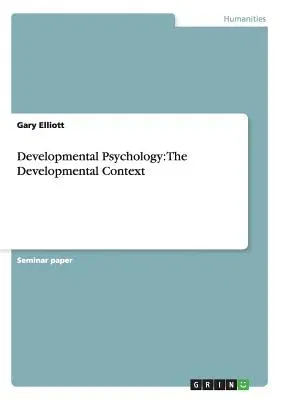Seminar paper from the year 2013 in the subject Psychology -
Developmental Psychology, ( Atlantic International University ),
language: English, abstract: The family system is the primary context
for the child's development and undoubtedly has the greatest impact. The
nature-nurture debate continues with regards the human development but
this paper focuses its attention on the child's development within its
family dynamic; how the child learns to socialise within the family
social system and how social issues in the broader sense impact on the
child's development. Beyond the primary context of the family, social
interactions in the child's peer group and the schooling environment aid
in moulding his social development. The impact of the school environment
and peer group selection will be discussed in the course of this paper.
In addition to the school environment, children make use of media
devices and media input more than they did a decade ago and this may
also have a profound impact on the child's perceptions of themselves and
the world around them; ultimately steering their development in a
particular direction. The importance and influence of family
relationships, peer relationships and socialisation within these
dynamics will dominate the content of this paper. Why a family dynamic?
The purpose of the family unit, from its inception with our early
ancestors, was and continues to be focused on ensuring the survival of
the species. The introduction of offspring enhances the need for
cohesion between the parents to safeguard the survival of the child and
the continuation of the species. As an extension, the cohesion of the
family unit will guarantee the survival of the extended society.
Survival of the society, and necessities for it to thrive include five
important components, these are outlined in Berk (2000) and are listed
as follows: - Reproduction - allowing for the continued numbers in the
society, mortality rates and kept stable with birth rates - Economic


